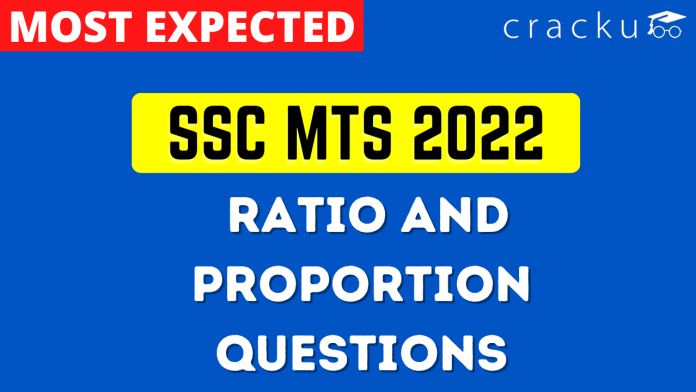Ratio and Proportion Questions for SSC MTS
Here you can download the Ratio and Proportion Questions for SSC MTS PDF with solutions by Cracku. These are the most important Ratio and Proportion questions PDF prepared by various sources also based on previous year’s papers. Utilize this PDF for Ratio and Proportion for SSC MTS. You can find a list of Ration and Proportion in this PDF which help you to test yourself and practice. So you can click on the below link to download the PDF for reference and do more practice.
Download Ratio and Proportion Questions for SSC MTS
Enroll to 15 SSC MTS 2022 Mocks At Just Rs. 149
Question 1: How much should be added to each term of 4 : 7 so that it becomes 2 : 3?
a) 2
b) 3
c) 4
d) 1
1) Answer (A)
Solution:
Let $x$ is added to the each term of 4 : 7
According to the problem,
$\frac{4+x}{7+x}=\frac{2}{3}$
$=$> $12+3x=14+2x$
$=$> $3x-2x=14-12$
$=$> $x=2$
Hence, the correct answer is Option A
Question 2: If $a : b = 3 : \sqrt 5$, then the value of (2a + b) : (3a — 2b) is:
a) $\frac{1}{64} (64 + 21 \sqrt 5)$
b) $\frac{1}{61} (64 + 21 \sqrt 5)$
c) $\frac{1}{62} (64 + 21 \sqrt 5)$
d) $\frac{1}{63} (64 + 21 \sqrt 5)$
2) Answer (B)
Solution:
Given, $a : b = 3 : \sqrt 5$
$=$> $\frac{a}{b}=\frac{3}{\sqrt{5}}$
$=$> $a=\frac{3}{\sqrt{5}}b$
$\therefore\ $(2a + b) : (3a – 2b) = $\frac{2a+b}{3a-2b}$
$=\frac{2\left(\frac{3}{\sqrt{5}}b\right)+b}{3\left(\frac{3}{\sqrt{5}}b\right)-2b}$
$=\frac{6b+\sqrt{5}b}{9b-2\sqrt{5}b}$
$=\frac{6+\sqrt{5}}{9-2\sqrt{5}}\times\frac{9+2\sqrt{5}}{9+2\sqrt{5}}$
$=\frac{\left(6+\sqrt{5}\right)\left(9+2\sqrt{5}\right)}{9^2-\left(2\sqrt{5}\right)^2}$
$=\frac{54+12\sqrt{5}+9\sqrt{5}+2\left(5\right)}{81-20}$
$=\frac{1}{61}\left(64+21\sqrt{5}\right)$
Hence, the correct answer is Option B
Question 3: What number must be added to each of the numbers 8, 13, 26 and 40 so that the numbers obtained in this order are in proportion?
a) 3
b) 2
c) 1
d) 4
3) Answer (B)
Solution:
Let the number which is added to make the numbers 8, 13, 26, 40 are in proportion = $x$
$=$> 8+$x$, 13+$x$, 26+$x$, 40+$x$ are in proportion
$=$> $\frac{8+x}{13+x}=\frac{26+x}{40+x}$
$=$> $\left(8+x\right)\left(40+x\right)=\left(26+x\right)\left(13+x\right)$
$=$> $320+8x+40x+x^2=338+26x+13x+x^2$
$=$> $320+48x=338+39x$
$=$> $48x-39x=338-320$
$=$> $9x=18$
$=$> $x=2$
$\therefore\ $The number which is added to make the numbers 8, 13, 26, 40 are in proportion = 2
Hence, the correct answer is Option B
Question 4: If an amount of $₹ 800$ is distributed between Ravi, Mohan and Govind in the proportions 2 : 5 : 3, then the sum of the shares of Mohan and Govind,is:
a) $₹ 400$
b) $₹ 640$
c) $₹ 560$
d) $₹ 240$
4) Answer (B)
Solution:
Given,
$₹ 800$ is distributed between Ravi, Mohan and Govind in the proportions 2 : 5 : 3
$=$> Share of Mohan = $=\frac{5}{2+5+3}\times\ 800=\frac{5}{10}\times800=₹ 400$
$=$> Share of Govind = $=\frac{3}{2+5+3}\times\ 800=\frac{3}{10}\times800=₹ 240$
$\therefore\ $Sum of the shares of Mohan and Govind = 400 + 240 =₹ 640
Hence, the correct answer is Option B
Question 5: The fourth proportional to 10, 12, 15 is:
a) 20
b) 18
c) 24
d) 22
5) Answer (B)
Solution:
Let the fourth proportional to 10, 12, 15 = $d$
$=$> $\frac{10}{12}=\frac{15}{d}$
$=$> $10d=180$
$=$> $d=18$
Hence, the correct answer is Option B
Take a free SSC MTS Tier-1 mock test
Download SSC CGL Tier-1 Previous Papers PDF
Question 6: Two numbers are respectively 25% and 65% more than a third number. The ratio of the two numbers is:
a) 16 : 17
b) 25 : 42
c) 25 : 33
d) 16 : 19
6) Answer (C)
Solution:
Let the third number = a
Given,
First number is 25% more than third number
$=$> First number = $\frac{125}{100}a$
Second number is 65% more than third number
$=$> Second number = $\frac{165}{100}a$
$\therefore\ $Ratio of first and second number = $\frac{125}{100}a:\frac{165}{100}a$ = $25:33$
Hence, the correct answer is Option C
Question 7: Dividing the amount ₹18,144 among three people A, B, C in the ratio 3 : 5 : 8, the amount B gets more than A, is:
a) ₹2,268
b) ₹2,386
c) ₹2,178
d) ₹2,464
7) Answer (A)
Solution:
Given, Total amount = ₹18,144
Ratio of amounts of A,B,C = 3 : 5 :8
Let the amounts of A,B,C are 3p, 5p, 8p respectively
$=$> 3p + 5p + 8p = 18144
$=$> 16p = 18144
$=$> p = 1134
$\therefore\ $The amount that B gets more than A = 5p – 3p = 2p = 2(1134) = ₹2,268
Hence, the correct answer is Option A
Question 8: If 2145 : x :: 3003 : 42, then the value of y so that x : 2508 :: y : 11704, is:
a) 156
b) 96
c) 212
d) 140
8) Answer (D)
Solution:
Given, 2145 : x :: 3003 : 42
$=$> $\frac{2145}{x}=\frac{3003}{42}$
$=$> $x=\frac{2145\times42}{3003}$
$=$> $x=30$
x : 2508 :: y : 11704
$=$> $\frac{x}{2508}=\frac{y}{11704}$
$=$> $\frac{30}{2508}=\frac{y}{11704}$
$=$> $y=\frac{30\times11704}{2508}$
$=$> $y=140$
Hence, the correct answer is Option D
Question 9: If 22% of x = 30% of y, then y : x is equal to:
a) 15 : 14
b) 11 : 15
c) 15 : 11
d) 17 : 16
9) Answer (B)
Solution:
Given, 22% of x = 30% of y
$=$> $\frac{22}{100}\times x=\frac{30}{100}\times y$
$=$> $\frac{y}{x}=\frac{22}{30}$
$=$> $\frac{y}{x}=\frac{11}{15}$
$=$> $y:x=11:15$
Question 10: The sum of three numbers is 79. If the ratio of the first number to the second number is 4 : 7 and that of the second number to the third number is 4 : 5, then the second number is:
a) 12
b) 28
c) 15
d) 35
10) Answer (B)
Solution:
Let the three numbers are a, b, c
Given, Sum of the numbers = 79
Ratio of first number to second number = 4 : 7
$=$> a : b = 4 : 7
$=$> a : b = 16 : 28
Ratio of second number to third number = 4 : 5
$=$> b : c = 4 : 5
$=$> b : c = 28 : 35
$=$> a : b : c = 16 : 28 : 35
$\therefore\ $Second number = $\frac{28}{79}\times79$ = 28
Hence, the correct answer is Option B
Question 11: What x is added to each of 10, 16, 22 and 32, the numbers so obtained in this order are in proportion? What is the mean proportional between the numbers (x + 1) and (3x + 1)?
a) 12
b) 9
c) 15
d) 10
11) Answer (C)
Solution:
If x is added to each of numbers, the numbers so obtained in this order are in proportion
so, $\frac{10 + x}{16 + x} = \frac{22 + x}{32 + x}$
(10 + x)(32 + x) = (16 + x)(22 + x)
320 + 10x + 32x + $x^2 = 352 + 16x + 22x + x^2$
320 + 42x = 352 + 38x
4x = 32
x = 8
(x + 1) = 8 + 1 = 9
(3x + 1) = 24 + 1 = 25
Mean proportional = $\sqrt{9 \times 25}$ = 15
Question 12: If A : B = 3 : 5, and B : C = 2 : 3, then A : B : C is equal to:
a) 3 : 8 : 6
b) 3 : 7 : 3
c) 6 : 10 : 15
d) 6 : 15 : 10
12) Answer (C)
Solution:
A : B = 3 : 5 —(1) and B : C = 2 : 3 —(2)
To find the A : B :C, we will equal the common term so,
equation (1) multiply by 2 and equation (2) multiply by 5,
A : B = 6 ; 10
B : C = 10 : 15
A : B : C = 6 : 10 : 15
Question 13: The ratio of boys and girls in a groupis 7 : 6. If 4 more boys join the group and 3 girls leave the group, then the ratio of boys to girls becomes 4 : 3. Whatis the total number of boys and girls initially in the group?
a) 117
b) 78
c) 91
d) 104
13) Answer (D)
Solution:
The ratio of boys and girls in a group is 7 : 6.
Let the boys be 7x and girls be 6x.
When 4 more boys join the group and 3 girls leave the group, then the ratio of boys to girls = 4 : 3
$\frac{7x + 4}{6x -3} = \frac{4}{3}$
21x + 12 = 24x -12
3x = 24
x = 8
Initially boys and girls = 7x + 6x = 13x = 13 $\times$ 8 = 104
Question 14: If an amount of Rs.990 is divided among A, B and C in the ratio of 3 : 4 : 2, then B will get:
a) Rs. 247.5
b) Rs. 440
c) Rs. 110
d) Rs. 350
14) Answer (B)
Solution:
Ratio of the A, B and C = 3 : 4 : 2
Amount = 990
Share of B = $\frac{4}{3 + 4 + 2} \times 990 = \frac{4}{9} \times 990 = Rs.440
Question 15: Two numbers are in the ratio 5 : 7. If the first numberis 20, then the second number will be:
a) 8
b) 22
c) 28
d) 18
15) Answer (C)
Solution:
Let the two numbers be 5x and 7x.
According to question,
5x = 20
x = 4
Second number = 7 $\times$ 4 = 28
Question 16: The total number of students in a class is 65. If the total number of girls in the class is 35, then the ratio of the total number of boys to the total number of girls is:
a) 6:7
b) 7:6
c) 13:7
d) 7:13
16) Answer (A)
Solution:
The ratio of the total number of boys to the total number of girls = 65 : 35 = 13 : 7
Question 17: The sum of the squares of 3 natural numbers is 1029, and they are in the proportion 1 : 2 : 4. The difference between greatest number and smallest number is:
a) 15
b) 21
c) 31
d) 18
17) Answer (B)
Solution:
Let the smallest number be x.
Numbers are x, 2x, 4x.
The sum of the squares of 3 natural numbers = 1029
$x^2 + (2x)^2 + (4x)^2 = 1029$
$x^2 + 4x^2 + 16x^2 = 1029$
$x^2 = 1029/21$
$x^2 = 49$
$x = 7$
Smallest number = 7
Greatest number = 4x = 4 $\times$ 7 = 28
The difference between greatest number and smallest number = 28 – 7 = 21
Question 18: 25 litres of a mixture contains 30%of spirit and rest water. If 5 litres of water be mixed in it, the percentage of spirit in the new mixture is :
a) $45\%$
b) $33 \frac{1}{3}\%$
c) $25 \%$
d) $12 \frac{1}{2} \%$
18) Answer (C)
Solution:
Quantity of spirit = $25\times \frac{30}{100} = 7.5$
Quantity of water = 25 – 7.5 = 17.5
After mixed up quantity of mixture = 25 + 5 = 30
Percentage of spirit = $\frac{7.5}{30} \times 100$ = 25%
Question 19: In wallet, there are notes of the denominations ₹10 and ₹50. The total number of notes is 12. The number of ₹10 and 50 notes are in the ratio of 1 : 2. Total money in the wallet is:
a) ₹ 360
b) ₹ 280
c) ₹ 110
d) ₹ 440
19) Answer (D)
Solution:
The ratio of the number of ₹10 and ₹50 notes = 1 : 2
The total number of notes = 12
The number of ₹10 notes = $\frac{1}{1 + 2} \times 12 = 4
Money from the ₹10 notes = 4 $\times$ 10 = Rs.40
The number of ₹50 notes = 12 – 4 = 8
Money from the ₹50 notes = 8 $\times$ 50 = Rs.400
Total money in the wallet = 40 + 400 = Rs.440
Question 20: A certain amount is divided among Sunita, Amit and Vibha in the ratio of 2 : 3 : 4. If Vibha gets ₹14,416, then the total amount is:
a) ₹16,219
b) ₹3,604
c) ₹43,248
d) ₹32,436
20) Answer (D)
Solution:
Ratio of the amount of Sunita, Amit and Vibha = 2 : 3 : 4
Let the amount of Sunita, Amit and Vibha be 2x, 3x and 4x.
Amount of Vibha = 14416
4x = 14416
x = 14416/4 = 3604
Total amount = 2x + 3x + 4x = 9x
= 9 $\times $ 3604 = Rs.32436





